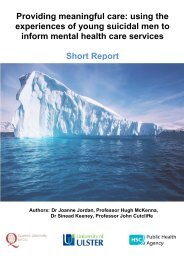Saving Mothers' Lives: - Public Health Agency for Northern Ireland
Saving Mothers' Lives: - Public Health Agency for Northern Ireland
Saving Mothers' Lives: - Public Health Agency for Northern Ireland
You also want an ePaper? Increase the reach of your titles
YUMPU automatically turns print PDFs into web optimized ePapers that Google loves.
222<br />
17 Issues <strong>for</strong> General Practitioners<br />
A woman with a history of epilepsy since childhood had experienced intolerable side effects<br />
from anticonvulsants so stopped treatment. When she became pregnant she did not want to try<br />
newer drugs because she was concerned about teratogenicity. She saw her GP after she had a<br />
single fi t, then again at the start of her second trimester, by which time she had had a few more<br />
fi ts. Her GP did not refer her back to her neurologist. She was referred urgently, by letter, by the<br />
obstetric registrar. He had found out about her fi ts because she reported them to the radiologist<br />
undertaking her routine fetal anomaly scan. The neurology appointment was given <strong>for</strong> a month<br />
later, by which time she had already died from SUDEP.<br />
Epilepsy is dangerous in pregnancy because it may be more diffi cult to control. This may be because<br />
therapeutic drug levels decline or because women may be reluctant to take their medication. Women who<br />
stop anticonvulsant therapy in pregnancy must be made aware of the risk of SUDEP. Here the GP missed the<br />
opportunity to refer her both at the start of pregnancy and urgently when her fi ts started. The obstetric registrar<br />
made an appropriate referral when he saw the woman, but a phone call would have been more effective than a<br />
letter. The neurologist did not recognise the urgency of the situation and responded too slowly.<br />
Mental health problems during pregnancy and /or after delivery<br />
Ninety-eight pregnant women or new mothers who died within a year of delivery, from whatever cause,<br />
were affected by or died as a result of a psychiatric disorder. These include deaths from suicide and drug<br />
overdose and violent deaths from murder, accidents etc. Although many of these deaths were not directly<br />
related to pregnancy these fi gures highlight the impact that ongoing mental health and substance abuse<br />
problems, particularly amongst the more vulnerable, have on maternal health. This Report has been<br />
recommending <strong>for</strong> the last few years that women are routinely asked in early pregnancy about signifi cant<br />
severe past mental health problems, and, if necessary, referred to the local perinatal psychiatric services<br />
to develop pre-emptive care and management plans. These policies have been widely adopted and it<br />
is gratifying to see that the number of women who died from suicide from a perinatal mental illness is<br />
signifi cantly reduced in this triennium.<br />
It needs to be more widely known that women who have had a previous episode of a serious mental<br />
illness either following childbirth or at other times, are at an increased risk of developing a postpartum<br />
onset illness even if they have been well during pregnancy and <strong>for</strong> many years previously. This risk of<br />
recurrence is estimated at least one in two <strong>for</strong> women with previous puerperal psychosis, as discussed in<br />
detail in Chapter 12. It is also known that a family history of bipolar disorder increases the risk of a woman<br />
developing puerperal psychosis following childbirth. The last two Reports 3, 4 found that over half of those<br />
women who died from suicide had a previous history of serious mental illness. Even if this history is known<br />
it may be communicated poorly to other members of the team,<br />
A young woman with existing children killed herself by violent means some weeks after the<br />
birth of her next child. She had a previous history of bipolar disorder with a number of hospital<br />
admissions <strong>for</strong> mania. She was last seen by psychiatric services shortly be<strong>for</strong>e the beginning of<br />
pregnancy and stopped her mood stabiliser medication at about this time. Her GP had mentioned<br />
her previous psychiatric history in his referral letter to the obstetrician, but the midwife was<br />
unaware of this history at the booking clinic. The woman was well during pregnancy, but no steps<br />
were taken to monitor her mental health following delivery.<br />
This woman faced a risk of recurrence of at least 50% in the fi rst three months after delivery. Her<br />
psychiatric team should have made the woman, her family and her GP aware of this. When she became<br />
pregnant again her GP should have told her midwife and should have referred her back to the psychiatric<br />
team so that a management plan could have been put into place. She should have restarted her



